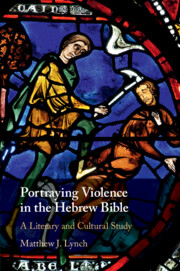Book contents
- Portraying Violence in the Hebrew Bible
- Portraying Violence in the Hebrew Bible
- Copyright page
- Publisher’s note
- Dedication
- Contents
- Acknowledgements
- Abbreviations
- Introduction
- Part I Violence and Ecology
- Part II Violence and Moral Speech
- Part III Violence and Justice
- 6 The Outcry of Violence
- 7 Judicial Responses to Violence
- 8 Violence and the Divine Avenger
- Part IV Violence and Impurity
- Conclusion
- Appendix
- Bibliography
- Index
6 - The Outcry of Violence
from Part III - Violence and Justice
Published online by Cambridge University Press: 06 May 2020
- Portraying Violence in the Hebrew Bible
- Portraying Violence in the Hebrew Bible
- Copyright page
- Publisher’s note
- Dedication
- Contents
- Acknowledgements
- Abbreviations
- Introduction
- Part I Violence and Ecology
- Part II Violence and Moral Speech
- Part III Violence and Justice
- 6 The Outcry of Violence
- 7 Judicial Responses to Violence
- 8 Violence and the Divine Avenger
- Part IV Violence and Impurity
- Conclusion
- Appendix
- Bibliography
- Index
Summary
Chapter 6 examines the outcry of the victim of violence. Understanding the formal or informal legal framework and ancient legal discourse around violence also helps us grasp with greater specificity the preoccupation among biblical writers with the ‘outcry’ of violence, the ‘violent witness’, and the receptivity of the responsible party (often Yhwh). These concerns each operate differently, but together highlight a central and driving concern with voicing – or revoicing – the otherwise unnoticed evil of violence, and setting it within a framework of appeal (usually prayer) to one with the capacity or responsibility to intervene and restore order. The preoccupation with verbal appeal via distress signals like the outcry highlight the fact that ancient Israel was not a legislative society. In other words, individuals did not, in the first place, appeal to laws for justice. While the Hebrew Bible does preserve legal codes, they were hardly ever the basis for judicial rulings. Instead, individuals had recourse to individuals who embody legal custom, and who, by community standards, act justly insofar as they fulfil their expected roles. This relational nature of justice meant that cries for justice to a judge or avenger were both morally driven and, to be effective, needed to be rhetorically persuasive.
- Type
- Chapter
- Information
- Portraying Violence in the Hebrew BibleA Literary and Cultural Study, pp. 151 - 166Publisher: Cambridge University PressPrint publication year: 2020



